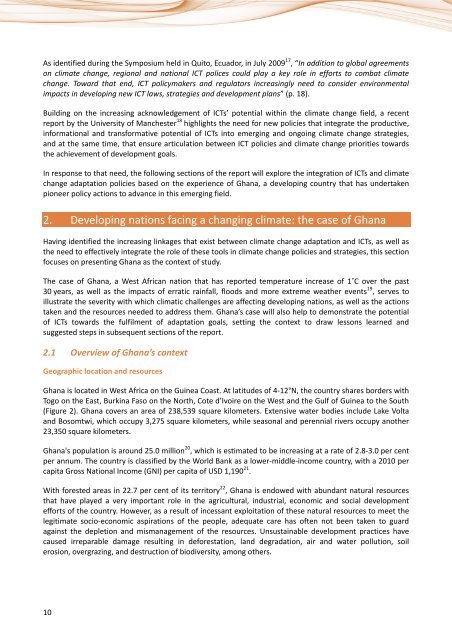Information and communication technologies (ICTs) and ... - ITU
Information and communication technologies (ICTs) and ... - ITU
Information and communication technologies (ICTs) and ... - ITU
You also want an ePaper? Increase the reach of your titles
YUMPU automatically turns print PDFs into web optimized ePapers that Google loves.
As identified during the Symposium held in Quito, Ecuador, in July 2009 17 , “In addition to global agreements<br />
on climate change, regional <strong>and</strong> national ICT polices could play a key role in efforts to combat climate<br />
change. Toward that end, ICT policymakers <strong>and</strong> regulators increasingly need to consider environmental<br />
impacts in developing new ICT laws, strategies <strong>and</strong> development plans” (p. 18).<br />
Building on the increasing acknowledgement of <strong>ICTs</strong>’ potential within the climate change field, a recent<br />
report by the University of Manchester 18 highlights the need for new policies that integrate the productive,<br />
informational <strong>and</strong> transformative potential of <strong>ICTs</strong> into emerging <strong>and</strong> ongoing climate change strategies,<br />
<strong>and</strong> at the same time, that ensure articulation between ICT policies <strong>and</strong> climate change priorities towards<br />
the achievement of development goals.<br />
In response to that need, the following sections of the report will explore the integration of <strong>ICTs</strong> <strong>and</strong> climate<br />
change adaptation policies based on the experience of Ghana, a developing country that has undertaken<br />
pioneer policy actions to advance in this emerging field.<br />
2. Developing nations facing a changing climate: the case of Ghana<br />
Having identified the increasing linkages that exist between climate change adaptation <strong>and</strong> <strong>ICTs</strong>, as well as<br />
the need to effectively integrate the role of these tools in climate change policies <strong>and</strong> strategies, this section<br />
focuses on presenting Ghana as the context of study.<br />
The case of Ghana, a West African nation that has reported temperature increase of 1˚C over the past<br />
30 years, as well as the impacts of erratic rainfall, floods <strong>and</strong> more extreme weather events 19 , serves to<br />
illustrate the severity with which climatic challenges are affecting developing nations, as well as the actions<br />
taken <strong>and</strong> the resources needed to address them. Ghana’s case will also help to demonstrate the potential<br />
of <strong>ICTs</strong> towards the fulfilment of adaptation goals, setting the context to draw lessons learned <strong>and</strong><br />
suggested steps in subsequent sections of the report.<br />
2.1 Overview of Ghana’s context<br />
Geographic location <strong>and</strong> resources<br />
Ghana is located in West Africa on the Guinea Coast. At latitudes of 4-12°N, the country shares borders with<br />
Togo on the East, Burkina Faso on the North, Cote d’Ivoire on the West <strong>and</strong> the Gulf of Guinea to the South<br />
(Figure 2). Ghana covers an area of 238,539 square kilometers. Extensive water bodies include Lake Volta<br />
<strong>and</strong> Bosomtwi, which occupy 3,275 square kilometers, while seasonal <strong>and</strong> perennial rivers occupy another<br />
23,350 square kilometers.<br />
Ghana's population is around 25.0 million 20 , which is estimated to be increasing at a rate of 2.8-3.0 per cent<br />
per annum. The country is classified by the World Bank as a lower-middle-income country, with a 2010 per<br />
capita Gross National Income (GNI) per capita of USD 1,190 21 .<br />
With forested areas in 22.7 per cent of its territory 22 , Ghana is endowed with abundant natural resources<br />
that have played a very important role in the agricultural, industrial, economic <strong>and</strong> social development<br />
efforts of the country. However, as a result of incessant exploitation of these natural resources to meet the<br />
legitimate socio-economic aspirations of the people, adequate care has often not been taken to guard<br />
against the depletion <strong>and</strong> mismanagement of the resources. Unsustainable development practices have<br />
caused irreparable damage resulting in deforestation, l<strong>and</strong> degradation, air <strong>and</strong> water pollution, soil<br />
erosion, overgrazing, <strong>and</strong> destruction of biodiversity, among others.<br />
10

















